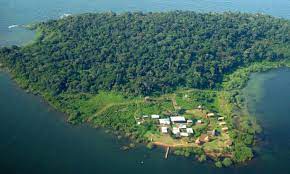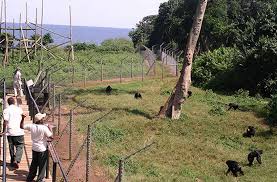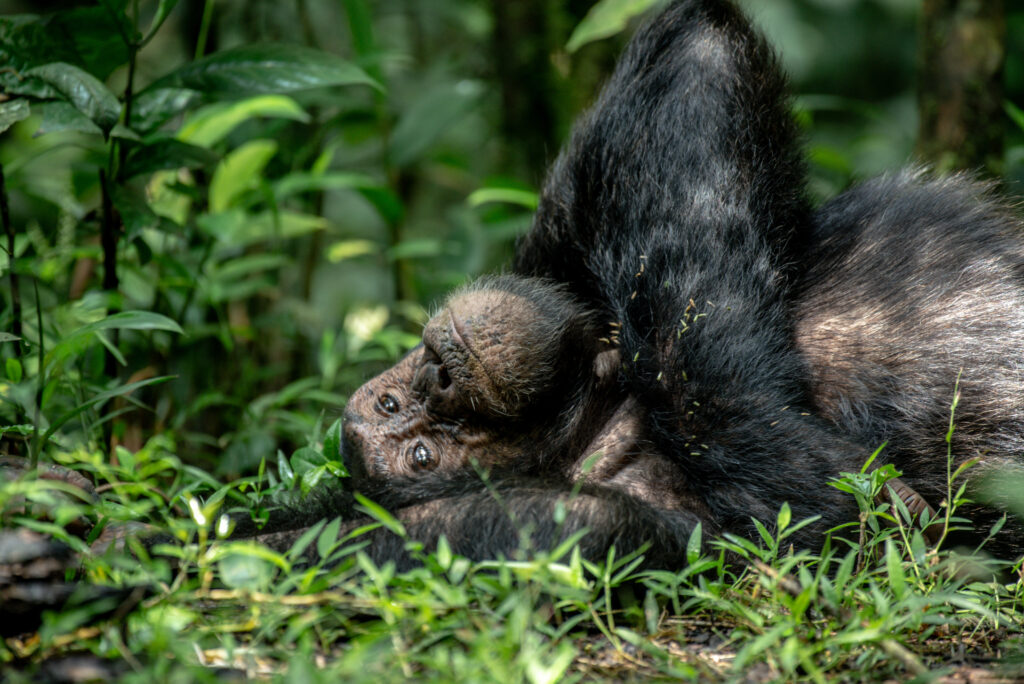The Chimpanzee sanctuary on Ngamba Island
Located in the northwestern part of Lake Victoria, Ngamba island chimpanzee sanctuary is one of the many islands that make Ssese.islands. Kalangala is the name of the entire district. This Island is home to now 52 orphaned and rescued chimpanzees from poachers. Chimpanzee trust is the only chimpanzee sanctuary in Uganda and it was established in 1998 after a number of chimpanzees where rescued from illegal hunters. The hunters hunt them for meat and sometimes to use them as pets.
Ngamba island chimpanzee sanctuary sits on 95 acres of land, covered by thick forest where the chimpanzees live, play and also find some naturally provided food. The major reason for setting up this sanctuary was to help the traumatized chimpanzees recover. After that they are re-introduced back to the forest so they can live a normal life like the others.
Today Ngamba does a lot more than rehabilitation. They have all the necessary information one may need about the chimpanzees, history of the sanctuary, the different activities done there and it is all very accessible to the visitors. 
Update
In 2023, the sanctuary celebrated 25 years since it opened and the occasion was graced by Dr. Jane Goodall. She is the founder of Jane Goodall institute, a peace ambassador and was also behind the establishment of the sanctuary 25 years ago. For the past so many years, Ngamba sanctuary has continuously grown from a small sanctuary with a few chimps to more than 50 of them as they are now including those that were born from the sanctuary.
The celebrations aimed at increasing awareness about conserving the Chimpanzees and their natural habitat. It is important that humans live in harmony with these animals if they are to survive. In addition, the celebrations aimed at setting a new goal and starting point for the next 25 years to come. The 25×25 fundraising campaign was also launched and the goal is to raise $250,000 throughout the next 25 years to run the sanctuary.
What to do or expect when you visit the chimpanzee sanctuary
Tour around the sanctuary
is the first thing the care givers give to the visitors so that you get an insight of what they do, what they have and may be what’s missing. This is how donations are got after visitors identifying how they can help the sanctuary grow.
Participate in the feeding session.
This is the time when the chimpanzees receive food and if you are apart of the team feeding, you get to stand on the wooden deck behind the fence and throw down the food to them. Chimpanzees feed on fruits like watermelons, mangos, pumpkins, vegetables, among others. Depending on what is provided that day, it is what you will feed them. There are two feeding sessions that visitors can participant in, lunch and dinner.
 There is also a restaurant where visitors can find some food for themselves while on the island, of course at a cost of between $10 -$15 per person incase you want to grab something to eat.
There is also a restaurant where visitors can find some food for themselves while on the island, of course at a cost of between $10 -$15 per person incase you want to grab something to eat.
Before, a trip to Ngamba was a one-day activity but now with some accommodation facilities on the island, you can have a night over. This is you a better experience with the Chimpanzees. In addition, you can also participant in other activities like the chimpanzee enrichment programs which are aimed at challenging these animals to think critically.
Join volunteer program
This is perfect for those who are passionate about wildlife and would wish to volunteer at any time of the year. You can volunteer for 1 week to a month long in return you get to contribute directly towards the survival of the chimps. Learn through first-hand experience of how the sanctuary is run on a daily basis. You can participate in the cleaning, preparing the chimps food and everything done on the Island.
Where do visitors sleep if they are to stay for an over or longer?
Ngamba Eco lodge. Located along the edge of the island with a clear view of Lake Victoria. A fully furnished accommodation facility with luxury and comfortable beddings. Comprised of 10 luxurious cottages, tent standard camping tents at double occupancy as well five standard tents at single occupancy. All rooms have amenities like hot water in the showers, rooms are well lit and have private decks where you can sit and unwind after a long day.
 Meals are served from the dinning area and later you can spend some time around the campfire as you listen to the chimpanzee making noise in the forest. And also sleep to the sound of the waves from the lake when you get to your room.
Meals are served from the dinning area and later you can spend some time around the campfire as you listen to the chimpanzee making noise in the forest. And also sleep to the sound of the waves from the lake when you get to your room.
What is the best time to Visit Ngamba Island?
You can visit Ngamba sanctuary any time of the year and get to experience and meet the chimpanzees. It is however more fun to visit during the dry months. This is because moving around and engaging in the different activities is much easier.
How do you get to Ngamba Island Chimpanzee Sanctuary?
Boats are available and organised on both private and shared. You chose to join the schedule boat which takes about 45minutes for a speed boat. Whereas the Motorised canoe takes 90 minutes.
The alternative route starts from Entebbe too but using a ferry to Buggala island which is the main island. Then from Bugala you can get a lake taxi to Ngamba Island. Plan your trip in time to avoid any form of disappointment.
For those starting their trip from Kampala, you will need a vehicle to take you to Entebbe Landing site. The drive from Kampala to Entebbe is 45 minutes. Then catch a boat to the island.
How much does it cost to go to Ngamba island?
The price for a trip to the island, varies according to the activities that one choses to do. In addition, it also varies or increases if you are spending night on the island. But the common Half day trip usually costs about USD 250 per person including transfers and entrance fees. All proceeds go back to managing the sanctuary.
How to book a Visit to Ngamba Sanctuary?
Identify a reputable tour operator like AA Safaris and Tours ltd. Contact them and advise them about adding Ngamba visit to your Uganda safari, they will happily incorporate it in your tour. Therefore, you will be able to contribute to this great conservation process.
